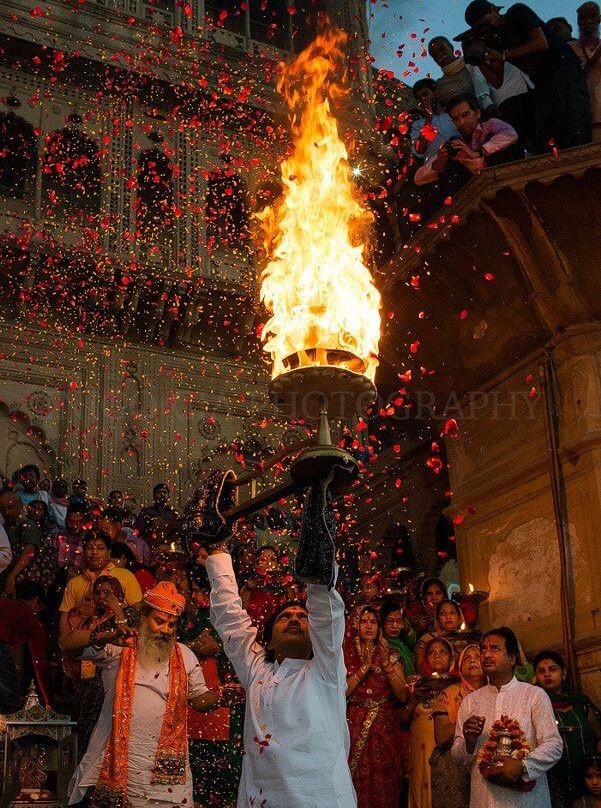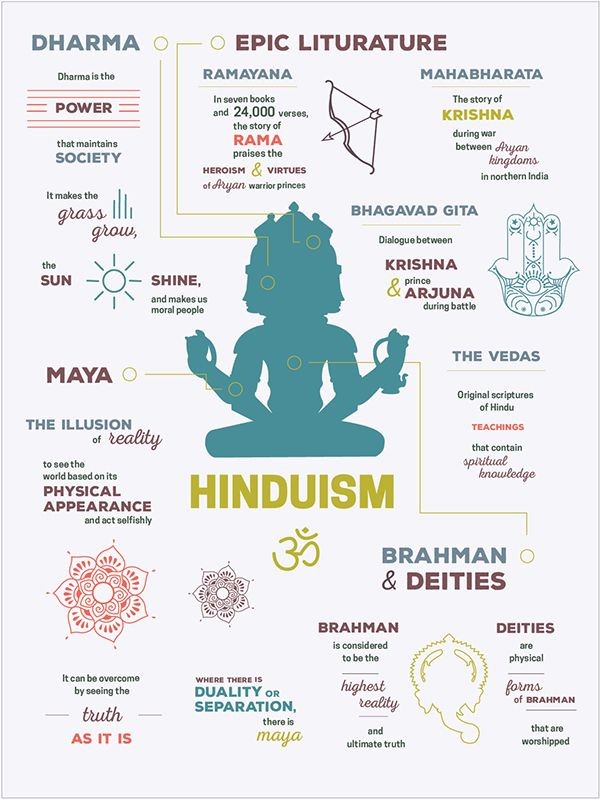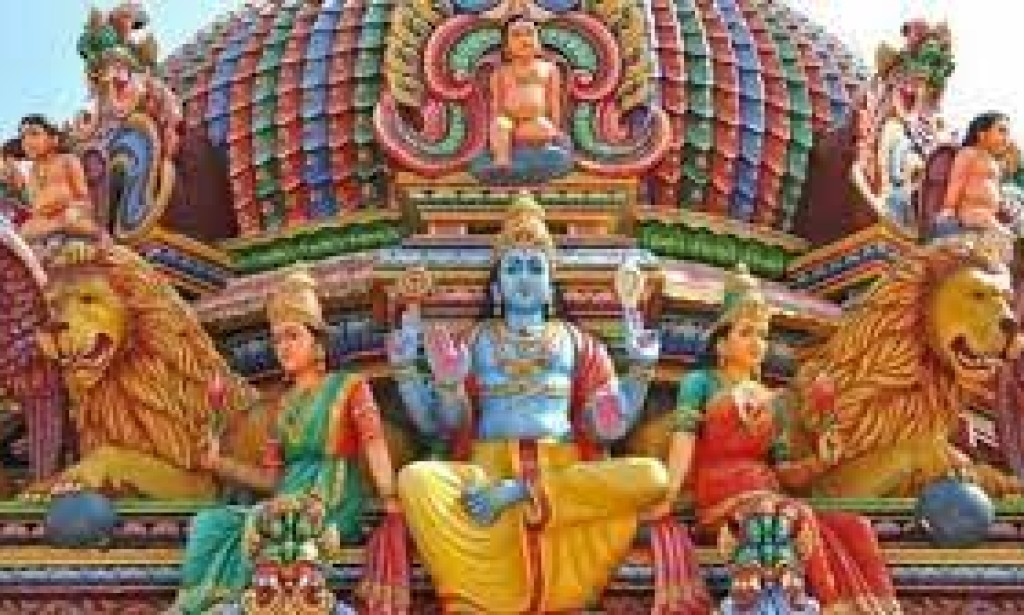Hinduism
Hinduism is a religion that originated in the Indian subcontinent and is believed to be one of the oldest religions in the world. It is a complex and diverse religion, with a rich history, culture, and philosophy. Hinduism is not only a religion but also a way of life. It has influenced the culture, art, literature, and philosophy of India for thousands of years.
History of Hinduism
The history of Hinduism dates back to ancient times, with the Indus Valley Civilization being one of the earliest known civilizations to practice the religion. Over time, Hinduism evolved and developed, with various texts and practices emerging.
Hinduism is one of the world's oldest religions and has a complex history that spans thousands of years. It is a diverse and multifaceted religion that originated in the Indian subcontinent and has influenced many other religions and cultures.
The roots of Hinduism can be traced back to the Indus Valley Civilization, which flourished between 2600 BCE and 1900 BCE in what is now Pakistan and northwestern India. Archaeological evidence suggests that the people of this civilization worshipped a mother goddess and several other deities.
Around 1500 BCE, a group of nomadic people known as the Aryans migrated to the Indian subcontinent and brought with them a new religion and culture. Over time, the Aryan religion merged with the indigenous beliefs of the Indus Valley Civilization, giving rise to what we now know as Hinduism.
The earliest sacred texts of Hinduism, known as the Vedas, were composed between 1500 BCE and 1200 BCE. These texts contain hymns, rituals, and philosophical teachings that have shaped Hinduism for thousands of years. The Upanishads, a collection of philosophical texts that explore the nature of the self and the universe, were composed between 800 BCE and 400 BCE.
Over the centuries, Hinduism has evolved and developed in many different ways. It has absorbed ideas and practices from other religions, such as Buddhism and Jainism, and has given rise to numerous philosophical and spiritual traditions, including Yoga, Vedanta, and Tantra.
Hinduism has also been shaped by social, cultural, and political factors. It has been influenced by India's caste system, which divides society into different social classes, and has been affected by the country's history of colonization and political upheaval.
Today, Hinduism is the third-largest religion in the world, with over 1 billion followers. It continues to evolve and adapt to changing times and circumstances and remains a vital and vibrant part of Indian and global culture.
Philosophy of Hinduism
The philosophy of Hinduism is complex and diverse, with various schools of thought emerging over time. The four main schools of Hindu philosophy are Samkhya, Yoga, Nyaya, and Vaisheshika. These schools of thought discuss the nature of reality, the purpose of life, and the relationship between the individual and the universe.
The concept of karma is also central to Hindu philosophy. Karma refers to the idea that our actions have consequences and that these consequences determine our future lives. The ultimate goal of Hinduism is to achieve moksha, which is liberation from the cycle of rebirth and the attainment of ultimate unity with the divine.

Gods and Goddesses
Hinduism has a pantheon of gods and goddesses, with each deity having its own unique characteristics and powers. Some of the major deities in Hinduism include Brahma, Vishnu, and Shiva. Brahma is the creator god, Vishnu is the preserver god, and Shiva is the destroyer god.
Other important deities in Hinduism include Ganesha, the elephant-headed god, Saraswati, the goddess of knowledge and wisdom, and Lakshmi, the goddess of wealth and prosperity.
Rituals and Practices
Hinduism has a rich tradition of rituals and practices that are performed to honor the gods and goddesses and to seek their blessings. Some of the common rituals and practices in Hinduism include puja, which is the worship of the deities, and yagna, which is a ritualistic sacrifice.
Other important practices in Hinduism include meditation, yoga, and fasting. These practices are used to achieve spiritual growth and to attain a deeper understanding of the self and the universe.

Caste System
The caste system is an important aspect of Hindu society, although it has been a subject of controversy and debate. The caste system divides society into four main groups: Brahmins, Kshatriyas, Vaishyas, and Shudras.
Each group has its own duties and responsibilities, and members of each group are expected to follow certain rules and traditions. However, the caste system has also been criticized for perpetuating inequality and discrimination.
The caste system is a social hierarchy that has been a part of Hinduism for centuries. It divides people into four main categories or varnas based on their occupation and social status.
At the top of the caste system are the Brahmins, who traditionally were priests and scholars. Next are the Kshatriyas, who were warriors and rulers. Then there are the Vaishyas, who were merchants and traders. And finally, at the bottom of the system are the Shudras, who were laborers and servants.
In addition to these four main castes, there are also many sub-castes and thousands of smaller caste groups. People are born into their castes and are expected to follow the traditional occupation and social customs of that caste.
While the caste system has been an integral part of Hinduism for centuries, it has also been the subject of criticism and controversy. Some argue that the system has been used to justify discrimination and oppression of lower-caste individuals, and there have been movements to challenge and reform the system. Nonetheless, the caste system continues to play a significant role in many aspects of Hindu society and culture.
Conclusion
In conclusion, Hinduism is a rich and diverse religion with a long and complex history. Its philosophy, deities, rituals, and practices have had a significant impact on the culture, art, literature, and philosophy of India. While the caste system has been a subject of controversy, Hinduism remains an important part of the spiritual and cultural heritage of India and the world.


You must be logged in to post a comment.